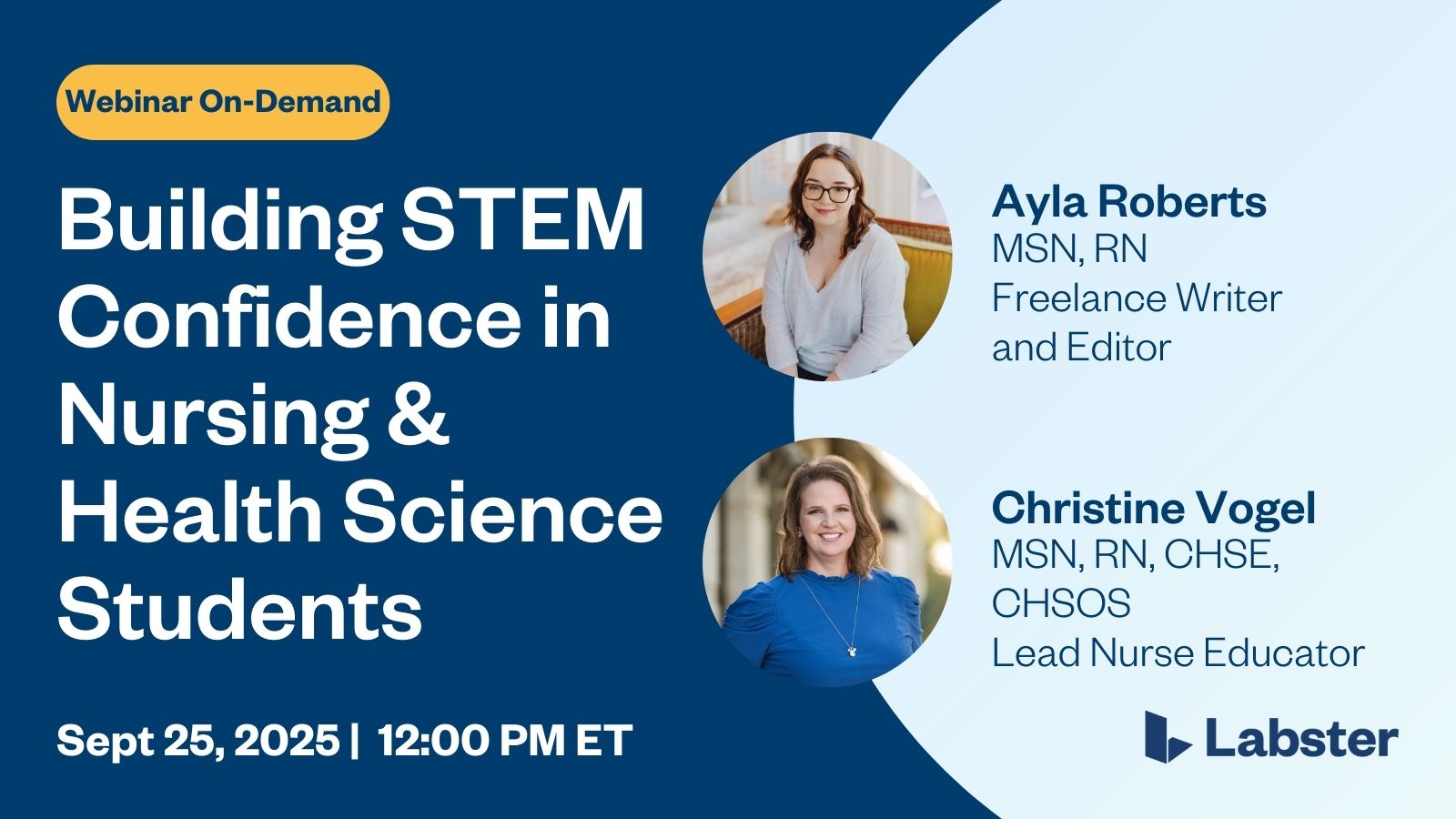
Author
Table of Contents
Name of the heading
Consider meeting with a Faculty Developer at your campus Centre for Teaching and Learning
Samantha Sullivan Sauer is a member of the chemistry faculty as well as a faculty developer at the Centre for Teaching and Learning at Georgian College. We interviewed Samantha to find out why - and how - science faculty can benefit by working with a Centre for Teaching and Learning at their own college or university.
Why is there a need for the Centre for Teaching and Learning?
At the college level, faculty are typically hired for content expertise or their industry expertise, and they may not have any teaching training or teaching experience. The Centre for Teaching and Learning at Georgian College supports faculty in developing the skills to be effective teachers.
What would you tell a colleague about going to a place like the Centre for Teaching and Learning? What could they expect from the experience?
Even though we are teaching students, this can be an isolating job. As faculty, we are creating lessons on our own and assessments on our own. When you're in the day-to-day, it's hard. I always look forward to the opportunity to interact with colleagues because it reinvigorates my love for teaching. It's especially important to connect with faculty outside of the course you're teaching or the program you're in because you can get different perspectives and different ideas.
To connect with a faculty developer, I think there has to be a desire to reflect on one's teaching practice and to learn new ideas and ways of teaching. One of the great things about the job I do is that the faculty who come to our sessions are there because they want to be there.
I always encourage faculty to attend a session or two from the Centre for Teaching and Learning because you never know where you're going to pick something up or who you're going to meet and want to continue a conversation with. We offer our annual Focus on Teaching Conference. And, whether or not I walk away with any tips or tricks, I always go because I get to make those connections and feel invigorated again about my job.

What kind of supports do faculty receive?
We try to provide supports to help faculty do what they want to do better. Most of us are faculty who've been in the classroom ourselves. I think the big thing we're all trying to do is take the educational research and literature and provide it in such a way that it's understandable and actionable for our faculty.
It can start with something as simple as 'how do you put together your syllabus so that it has the information that students want and also helps you?' Or it can lead to questions like 'how do you add collaboration so that students are working together in the classroom?' 'How do you have active learning in your classroom versus the traditional lecture?' And 'How can you design good assignments and assessments?'.
Did you go to the Centre when you were teaching chemistry?
Yes. It gave me an opportunity to talk with other faculty outside of my specific program area - I think that’s one of the best tools that the Centre for Teaching and Learning offers. We can learn so much from our peers, just by talking about how we do things in the classroom, how we work with students, how we support students, and how we create assessments.
You're a classroom instructor. What led to your work as a faculty developer in the Centre for Teaching and Learning?
I was looking for a chance to do something different for a little while, outside the direct teaching role. Our Centre for Teaching and Learning has always been really supportive of me, and I wanted to give that back to other faculty.
By no means am I an expert. I just do the best that I can to support faculty with the knowledge that I have and the continuous learning I’m working on. And if they can take one little thing away from a session that I offer and it makes their lives a little bit easier and their students' learning a little bit more enjoyable, then I'm happy.

What have you learned so far?
I've spent the last five months doing a lot of reading and a lot of research on assessment and Universal Design for Learning and other key teaching and learning approaches. I had been doing all of these in some aspects for years, but now I'm seeing the broader picture, why things are important, and how some of the things faculty stumble upon can actually be linked to a much larger concept and philosophy of teaching.
Assessment is one of my focus areas. You know, coming from the STEM world, we do quizzes, we do tests, and we do labs. But one of the latest theories in learning is to offer alternative assessment or authentic assessment. It's asking, 'what can we do other than a closed-book, high-stakes exam that causes high stress for students?' 'How else can we have students demonstrate they've met the learning outcomes?
Why do you advocate using authentic assessment?
The Ontario College System is typically more career-focused than a university. Our students at Georgian College are in programs that are training them to be employable in a specific career. So creating an authentic assessment is asking, 'what can we have the students do as part of their learning to make a link with that career?' So, you're teaching a concept in chemistry and students are learning it because it's going to be done as a part of their career. Making learning tasks authentic helps students see the relevance.
Formative assessment
When I put together my chemistry course, I typically have a fair number of formative assessments - quizzes that check in with students so they can see where they are, and I can see where they are.
Students can be using the quizzes to say, 'hey, I didn't do well on that, I need to go back and refresh'. That is the goal. I can't say that students always get to that point, but the goal is to take the low-stakes, formative assessment, and use that to help them figure out where they're going.
Making the connection between theory and application
With the labs, it's linking the lab to the theory material so students can see the application of that information. In chemistry, it's hard to make a strong connection between the lab and the theory. If I was teaching secondary school in grades 9-12, we could do demos. We could have a little lesson and do a lab on the same day so students could see the connection. But when you're teaching post-secondary, making those connections is harder - you teach the theory in a three-hour block one day, and then later in that week, you'll have a two-hour block for the lab.
And quite often doing a lab means that you do the procedure, get the results, and then go home and figure out what's going on later. In an ideal world, changing that pattern would be nice. But, we have to fit within the constructs of the way post-secondary scheduling works now. I have a colleague who's using Labster to link labs to some of the theory, to using equipment that we don't have access to, and to processes that we can't run in our lab.
What are some of the challenges you see in building effective assessments?
My students are typically taking either six or seven courses at the same time. I always give some consideration to what other courses the students are taking and where mine falls on the priority list before I give students a lot of additional exercises or activities outside of the classroom.
I'll be honest, if there isn't a mark tied to it, quite often it's not completed. Our students are trying to work, sometimes full-time, to pay for school. And quite often, they have families. So, it's always a balance.
What will you take with you from your experience in the Centre for Teaching and Learning?
Now that I've begun my experience as a faculty developer, I'm looking forward to going back into the classroom. I’ve learned so much about the theories of teaching and learning. And I’ve been teaching for over 13 years! When I go back to teaching chemistry, it will be really interesting to see how I put my lessons together and teach my classes.
FAQs
Heading 1
Heading 2
Heading 3
Heading 4
Heading 5
Heading 6
Lorem ipsum dolor sit amet, consectetur adipiscing elit, sed do eiusmod tempor incididunt ut labore et dolore magna aliqua. Ut enim ad minim veniam, quis nostrud exercitation ullamco laboris nisi ut aliquip ex ea commodo consequat. Duis aute irure dolor in reprehenderit in voluptate velit esse cillum dolore eu fugiat nulla pariatur.
Block quote
Ordered list
- Item 1
- Item 2
- Item 3
Unordered list
- Item A
- Item B
- Item C
Bold text
Emphasis
Superscript
Subscript





